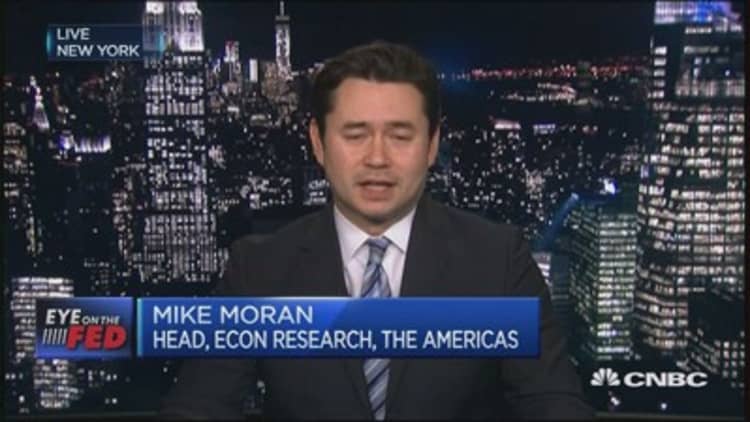
The Federal Reserve may have set itself on the path to more interest rate hikes, but it's likely to need to reverse course and cut by the end of the year, Mike Moran, head of economic research at Standard Chartered, told CNBC's "Squawk Box."
Moran's call is rare among forecasters from major banks, many of whom expect the Fed to steadily lift rates over the course of this year. His views still chime with those of Ray Dalio, founder of the world's largest hedge fund, who told CNBC last week that the Fed should provide more stimulus.
Moran's timeline is not particularly straightforward either. Standard Chartered expects one more rate hike in March, followed by a cut at the end of the year.
"Looking in the next six to 12 months , the momentum in the U.S. economy just isn't there," he said. "The economic conditions, the backdrop for these continuous hikes that the Fed is talking about is just not going to be there by the end of this year, which is why we think they might have to reverse course."
The Fed and the markets have been at odds over the central bank's interest rate forecasts. When it raised rates for the first time in nine years in December, the forecasts of Fed officials pointed to four additional hikes for this year. As of now, the market is pricing in one hike and each piece of disappointing economic news has reinforced that view.
But Fed watchers don't expect the central bank to budge on its rate hike view in the statement it is expected to release at 2 p.m. ET. The Fed is not holding a news briefing after the meeting, nor is it releasing new economic or interest rate forecasts until March.
Moran said the Fed's economic projections are "very rosy," particularly on inflation expectations.
In December, the U.S. consumer price index (CPI) fell 0.1 percent on-month after being unchanged in November as energy prices fell. That poses a sharp differential with the Fed's 2 percent inflation target.
"We're obviously still dealing with the aftermath of oil prices coming down. It's fallen obviously again over the course of this year," Moran said. "When you think about how much inflation can really come up to meet that Fed expectation just based on their own base scenario, it's actually looking very unlikely at this stage. "
Moran is also concerned about and its impact on corporate profitability.
"Corporate profitability runs in cycles and the last few quarters we are beginning to see that growth rate start to fall," he said, noting that Apple's earnings, released Tuesday, also saw a significant hit from currency fluctuations.
With more than half its earnings from outside the U.S., Apple saw a big hit from dollar strength, saying that revenue would have risen 8 percent without the currency effect, compared with the less than 2 percent on-year rise it reported for the quarter.
Moran expects that drumbeat of economic news will get worse ahead and that will force the Fed to back out of its hikes and that's going to hurt market sentiment.
"Ultimately, if they were to cut rates because the economy was weak -- we're talking seriously about potential recession risk at the end of this year or early 2017 -- I think the responsible decision would be as a central bank to respond to the data and react accordingly," he said. "The other side of that argument is there's going to be people who are asking about really the credibility of the Fed here. Do they really know what they are doing? Are their models not projecting or taking into account the correct data or indeed the analysis?"
But Moran noted that while it's rare for a central bank to reverse course on rate hikes, it's not unprecedented, citing the European Central Bank's moves in 2011 as the European debt crisis was unfolding. It's also been done by Sweden in 2011 and by Australia and New Zealand, he noted.
"From a market standpoint, I think that action of being responsive to the data and the real conditions of the global economy as well as the U.S. economy, I think is some cause for good news," he said.
-Patti Domm contributed to this article
—By CNBC.Com's Leslie Shaffer; Follow her on Twitter @LeslieShaffer1



